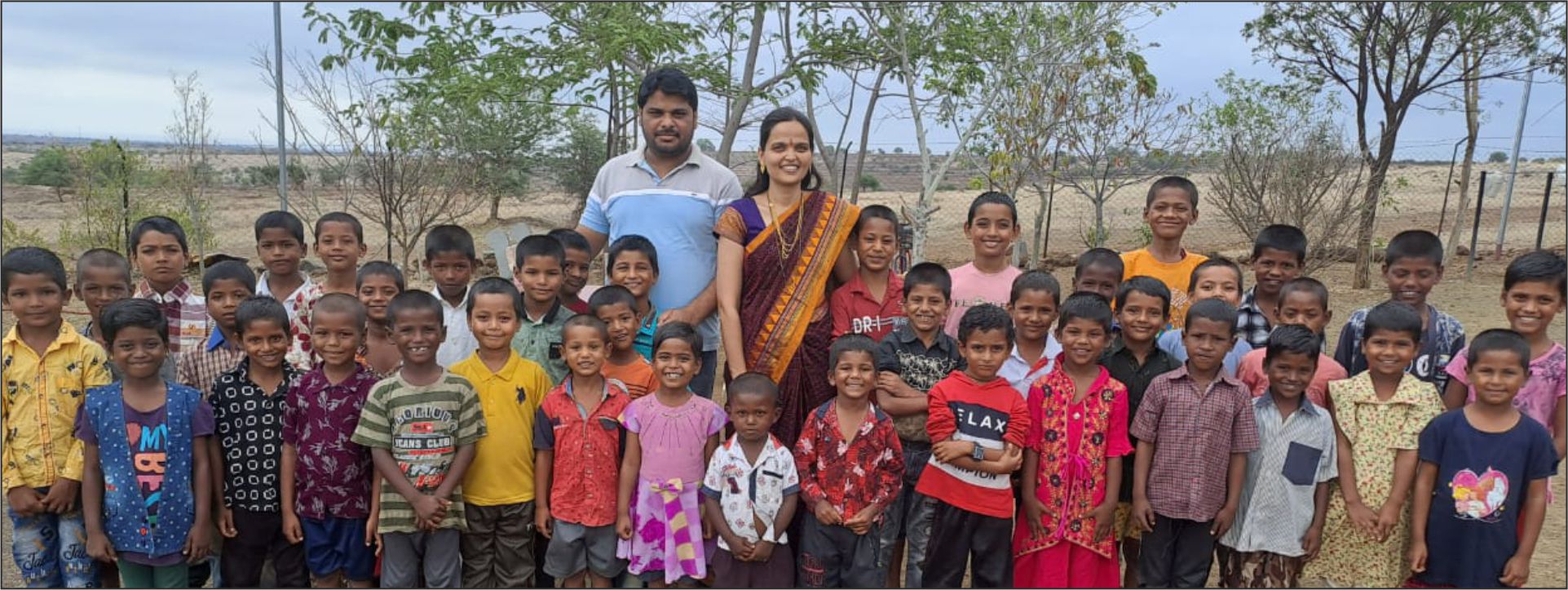Transforming Lives: Ajith Foundation's Journey from Streets to Education

- Ryhea George
- 09 Nov, 2023
Mahesh Nimbalkar, a schoolteacher in a government school earning a decent income, was not satisfied with his contributions to society. He wanted to do more for the community and decided to start helping children from the streets, who were begging, by providing them with education and schooling throughout the state of Maharashtra. Since 2007, after resigning from his teaching job, Mahesh and his wife Vinaya have been working on their initiative known as the Ajit Foundation, giving hope and a new life to many homeless children who had been forced to earn or beg for a living.
Here's a description of how this foundation has helped thousands of people transition from life on the streets to living an average middle-class life independently.
Initiating the journey back to normalcy
Vinaya explains that when these children, regardless of their age, arrive at the foundation, they have been conditioned to live in survival mode. Many students don't even know how much they should eat, often consuming as much as they can to avoid hunger later. It takes time to change such behaviors, and most children learn to control these habits after a minimum of two months. The foundation also trains them in basic hygiene, including defecation and cleanliness, as these children come from backgrounds where nobody has taught them these essential skills. When a girl child joins their family, Vinaya starts by untangling and removing lice from their hair, which can be shocking for these children who often go without combing their hair for days while living on the streets. They also educate the children about their developing bodies, the differences between good and bad touch, and provide training for adolescence. When asked how they convince parents to let their children join the foundation, Mahesh and Vinaya show them the long-term benefits of education, explaining that their children, who may earn only a few coins daily on the streets, can earn ten times more after completing a course. Such methods give parents hope for their children's future, leading them to allow their children to join the foundation. The students also receive training in overall personality development throughout their time at the foundation.
Teaching through traditional methods:
When students first enroll at the foundation, they often believe that begging and earning money on the streets is the best way to live. Teaching them can be challenging, as they prefer to spend time earning money rather than reading books. Vinaya and Mahesh make it a rule that these students do not touch any books or slates for at least six months. The teaching starts with traditional methods such as counting with stones, marbles, and leaves, and learning how to communicate through informal conversations. In the initial stages, students are taught basic etiquette and how to interact politely with others. Vinaya mentions that many children who join the institution know a lot of slurs and vulgar language, but the foundation works to discourage the use of such words and promote polite behavior. As the students become more adjusted, the foundation introduces conventional teaching methods, including slates, chalk, and simpler books. Children who join the foundation at an early age are usually placed into grades, while those who join at or above the age of 15 are given the option to participate in skill development programs, learning basic computer skills, electrical work, or plumbing to provide them with employable skills.
Democratic way of teaching:
The foundation has two main projects located in Bharsi Solapur: a school and a hostel in Talegaon Dabade. With a total of 120 children in this institution, the school and the hostel are run democratically, with the goal of teaching the children to solve their problems independently. This democratic style of teaching includes student-led committees like the Student Gram Panchayat, a Student's Bank, a Student's Kitchen, and even a Student's Court, where student judges handle complaints and student lawyers defend their peers. Vinaya Nimbalkar explains, "Through this initiative, we wanted to train the students to take responsibility for their actions, and since the school and the hostel are located in remote areas, finding help was almost impossible. We wanted to ensure that the students are capable of handling any situation. Students at this school, many of whom have slipped through the cracks of today's regimented, test-driven school system, thrive in a nurturing environment that allows them the freedom to chart their own learning path while fostering emotional growth and interpersonal skills. At these democratic schools, students not only learn traditional academic subjects but also valuable lessons about responsibility, problem-solving, social justice, and most importantly, how to relate to each other. Our focus on community building encourages students to pursue their dreams, contribute positively to society, and become agents of change."
Caring for them after they leave the nest:
Once students complete their nesting period and reach 18 years of age, they seek various job opportunities to support themselves. However, what remains behind is the fond memories of the foundation. Many students return to visit the foundation and the Nimbalkars, sometimes offering donations. When these former students come back, Vinaya continues to guide them, making sure they do not engage in smoking, drinking, or using vulgar language again. Vinaya considers these children as her own, even after they have outgrown her lap. She believes that if not for Mahesh, she would have never discovered this purpose in life. The foundation relies solely on donations, and any amount is accepted. You can find them on all social media platforms under the name "Ajit Foundation."




